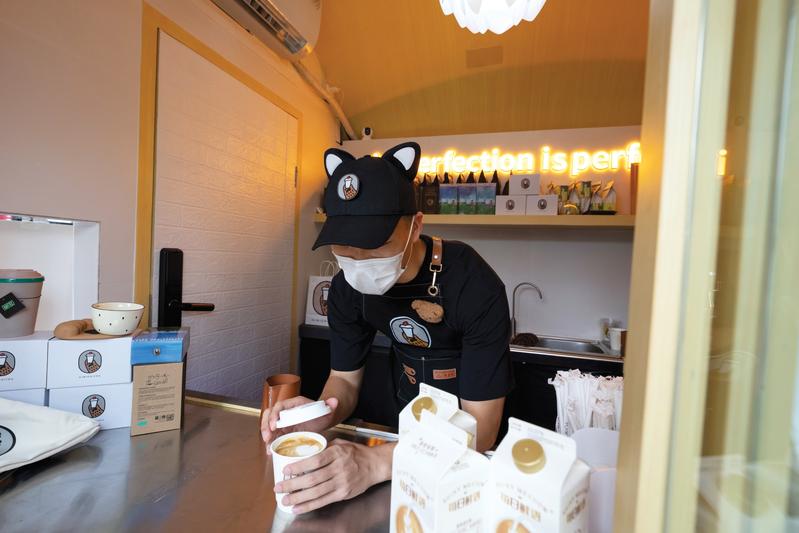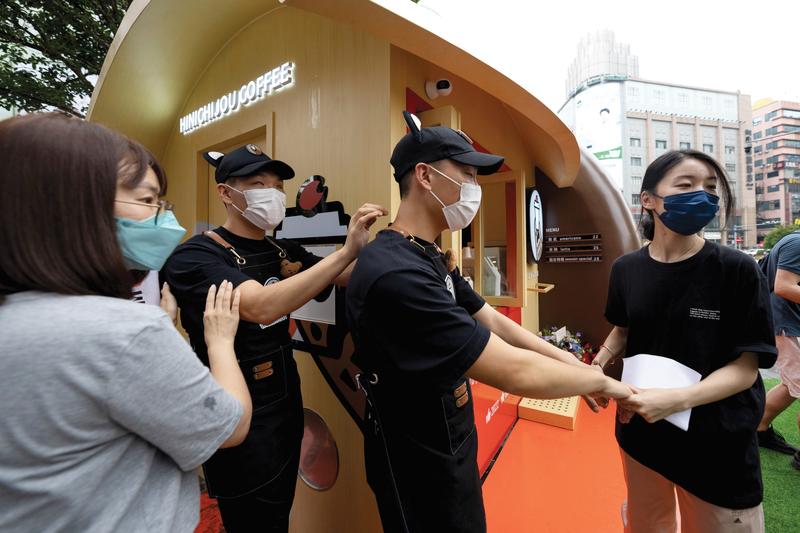 Blind baristas serve coffee at the first cafe to employ visually impaired people in Shanghai, on July 16. (GAO ERQIANG / CHINA DAILY)
Blind baristas serve coffee at the first cafe to employ visually impaired people in Shanghai, on July 16. (GAO ERQIANG / CHINA DAILY)
Wang Tian, a founder of Bear Paw Cafe, which went viral online in 2020 because its coffee was served by a bear claw poking out of a hole in a wall and most of its staff were hearing-impaired, did not expect the opening of his next store to be met with the same fanfare.
But it was, because the Shanghai businessman’s latest coffee offering also specializes in the employment of people with disabilities, this time, the blind.
Shaped like an acorn, the pioneering Seed Shop is a new Bear Paw branch in Times Square in Shanghai’s Pudong district. Among its baristas are twin brothers Yin Tianbao and Yin Tianyou, both of whom are blind.
Even before the small cafe opened, word about it spread online and interest quickly grew.
“We received many messages beforehand from organizations that care for the disabled and social welfare organizations. They said they would come to the grand opening to support the blind brothers. About 2,000 people were expected to attend the opening event,” Wang said.
Fearing a big crowd would increase health risks as the city continues to struggle with COVID-19, Wang changed his original plan and opted for a soft opening with fewer people.
It has long been a dream of Wang’s to empower people with disabilities, and after the success of the original Bear Claw Cafe, the keen entrepreneur set about his next endeavor, this time seeking to employ people with vision impairment.
Both Wang and his blind employees faced a series of challenges, not least training the brothers how to use the coffee-making equipment safely while at the same time making a great brew.
Born blind, Yin Tianbao, who is in his early 20s, is the café’s manager. It was no easy task for him to master the art of being a barista. In fact, to do so he practiced by making more than 100 cups of coffee a day.
“There is no other way but to practice over and over again,” said Yin Tianbao, adding: “Training muscle memory is easier said than done.”
It paid off, and he can now make a great cup of coffee in two minutes and has even mastered making latte. His efforts inspired his twin brother, Yin Tianyou, who is also blind, to follow in his footsteps.
“Coffee-making has shown me that I need to be bold and be willing to try new things. Success comes from failure. If I can succeed in this, maybe I can succeed in many other things,” Yin Tianbao said.
Their coffee-making has been made possible by the donation of a customized coffee machine specially developed for the twins. The machine, made by Italian coffee equipment brand Rhea Vendors, features buttons in different shapes to help the blind navigate its operation.
“The customized coffee machine helps me a lot, otherwise, there may (only) be few cups of good coffee,” said Yin Tianbao.
According to statistics from the China Disabled Persons’ Federation, the total number of people with disabilities nationwide has reached 85 million, 17 million of them with visual impairment.
 Two blind employees walk out of the Seed Shop with the help of their colleague. (GAO ERQIANG / CHINA DAILY)
Two blind employees walk out of the Seed Shop with the help of their colleague. (GAO ERQIANG / CHINA DAILY)
Wang said that despite there being many people with visual impairments who want to work, there are very few opportunities apart from working as massage therapists or phone operators.
“Therefore, I wondered if I could help them find a job or start up their own business to give them more options for employment,” Wang said. To date, about 80 percent of the employees at his nine stores have disabilities.
According to Wang, the design of the new cafe was arrived at after discussions with Yin Tianbao to ensure that it offered a suitable working environment and equipment for employees with disabilities.
Wang said the Seed Shop can be used as a template for more outlets and potentially rolled out at other locations across the country.
Wang and his team are willing to give free training for other blind people in Shanghai, develop identical stores and enable the visually impaired to move to other cities where they can start businesses.
“Most of the designs were based on my ideas. They had many discussions with different teams and designed the store specifically to meet my needs,” Yin Tianbao said.
The Yin brothers and their new shop have already won the hearts of the neighborhood, with locals regularly lining up for a fresh cup of coffee.
“A cup of coffee doesn’t do justice to the amount of effort they have to put in,” said customer Li Xiaoxing.
Shanghai is also home to other eateries that provide help and support for vulnerable groups.
Lili Time, an eponymous coffee house, is the first and only authorized social enterprise of its kind in Shanghai, and more than half of its employees are hearing-impaired.
According to official data, there were 80,000 people in the city with hearing impairment in 2021.
Zhang Lili, the owner Lili Time, has named her latest specialty range of drip coffee “The Ray of Hope”.
She hoped the name would attract more customers and rescue her business after the COVID-19 outbreak in the city led to its closure for almost two months.
The new product’s packaging is decorated with sketches depicting special memories like neighbors helping each other during lockdown, and medical workers and office staff working from home. The drip coffee costs 61 yuan ($9.10) per pack.
The idea seems to have worked. A WeChat post about her café was read more than 100,000 times and the number of in-store customers has soared. Also, some other businesses contacted her for possible collaborations.
As of the end of June, more than 20,000 boxes of her drip coffee, the type which is made by dripping hot water through a coffee filled filter, have been ordered and the store has gradually recovered from financial distress.
To enhance work efficiency, 11 new employees with hearing loss have joined the staff. The store has also received help in packing from logistics teams in Shanghai and in Yiwu, Zhejiang province, as well as from teachers at local training institutions that have suspended business since March.
“I ran the store in a traditional way, with offline purchasing and face-to-face communication, rather than digitizing everything, hoping that the hearing-impaired employees could better fit themselves into society,” she said.
Wearing face masks has made things even more difficult, as workers have trouble reading lips or hearing customers clearly from a social distance.
“I can’t hold my tears when seeing a picture of an employee making coffee and a customer standing far away from him waiting. I know his anxiety under such circumstances,” she said.
“I’m also determined to overcome the obstacles and safeguard their work,” said Zhang.
In 2019, the store became a place for the hearing-impaired to thrive in work, and has since been a spot where they sharpen their coffee-making and bartending skills.
“I’ll continue training deaf people, maybe also teens with autism, to expand their careers as baristas, florists and manicurists,” Zhang said. “I respect their excellence and infinite possibilities in work.”


